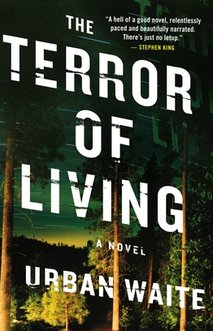
08 Feb 2011 07:57:33
Does our past influence on our today life, even if passed a lot of time? The author think that yes. An accidental killing during a burglary 20 years earlier has set horseman turned drug runner Phil Hunt on a course he cannot break. For deputy Bobby Drake, the fate of his father, a disgraced sheriff also involved in the Northwest drug trade, never leaves his mind for long.
When Hunt and Drake cross paths in the mountains near the border that separates Washington state and British Columbia, nothing goes right for either man. Matters move from bad to bloody, as they usually do when a quarter-million dollars of heroin goes missing. The dealers who want their drugs back quickly dispatch a knife-happy fixer, Grady Fisher, who finds all kinds of pleasure in butchering all kinds of creatures.
Hunt and Drake share a fatal flaw — a sense of honor — common to many characters in crime novels. They cannot walk away from looming disaster if their own integrity is threatened or, and perhaps especially, if an innocent person's life is at stake. Like the depraved Fisher, they just cannot help themselves.
Fisher provides both men an opportunity to reconcile with their lives, but at great cost. The question is whether Hunt and Drake can face up to the past and still have any kind of future.
One cannot help but recall Cormac McCarthy's "No Country for Old Men" while reading Waite's novel. Their plots — a manhunt sparked by a drug deal gone bad — and their main characters — a sympathetic lawbreaker, a conflicted lawman and a disturbed killer — invite comparison. Soon, though, Waite's own story and his smooth prose take over so completely that all that matters is what happens next.
When Hunt and Drake cross paths in the mountains near the border that separates Washington state and British Columbia, nothing goes right for either man. Matters move from bad to bloody, as they usually do when a quarter-million dollars of heroin goes missing. The dealers who want their drugs back quickly dispatch a knife-happy fixer, Grady Fisher, who finds all kinds of pleasure in butchering all kinds of creatures.
Hunt and Drake share a fatal flaw — a sense of honor — common to many characters in crime novels. They cannot walk away from looming disaster if their own integrity is threatened or, and perhaps especially, if an innocent person's life is at stake. Like the depraved Fisher, they just cannot help themselves.
Fisher provides both men an opportunity to reconcile with their lives, but at great cost. The question is whether Hunt and Drake can face up to the past and still have any kind of future.
One cannot help but recall Cormac McCarthy's "No Country for Old Men" while reading Waite's novel. Their plots — a manhunt sparked by a drug deal gone bad — and their main characters — a sympathetic lawbreaker, a conflicted lawman and a disturbed killer — invite comparison. Soon, though, Waite's own story and his smooth prose take over so completely that all that matters is what happens next.

